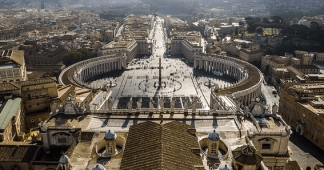Is Draghi embellishing a crisis to sidestep democracy?
By Thomas Fazi
Sep. 27, 2021
On October 15, Italy will become the first country in Europe where you will need a “Covid passport”, or “green pass”, to access not only most public spaces (as is already the case for all citizens over the age of 12) but all workplaces as well, public or private. The pass proves that you’ve been vaccinated against Covid-19, have recently tested negative or have recovered from the disease within the past six months. Anyone without one risks being put on unpaid leave and fined as much as 1,500 euros.
Some other European countries — most notably France — have similar measures in place, requiring proof of Covid status to gain access to indoor restaurants, museums, theatres and cultural events, or to work in certain sectors such as healthcare. But nothing comes close to Italy’s scheme in terms of range and scope; the only other country in the world to have introduced a mandatory Covid passport for all workers is Saudi Arabia.
How did Italy reach this point? Essentially, the Italian government adopted a textbook frog-in-boiling-water approach. The green pass was announced in mid-July, pretty much out of the blue, despite very few hospitalisations for Covid and a vaccination rate well above the European average. When they first came into force on August 6, they were initially limited to indoor restaurants, museums, cinemas and sports venues. Given that it was the middle of the holiday season, and that most restaurants in the summer offer outdoor seating (no green pass required), the impact of the measure was initially rather limited
But that soon changed. On September 1, the green pass became mandatory also for medium and long-distance public transport, as well as for all school teachers, staff and university students. And just a week ago came the decision to extend it to all public and private-sector workers — a move that caught almost everyone by surprise.
As the rules became increasingly restrictive, opposition to the green pass started growing as well: thousands of people, who were largely vaccine-hesitant, started taking to the streets in several Italian cities. Some demonstrators even went so far as to compare themselves to holocaust victims by wearing Star of David badges, like those worn by Jews in Nazi-era Germany, bearing the words “not vaccinated”.
Such comparisons are ridiculous, but the source of the protesters’ discontent is not. Covid passports — especially when so sweeping in scope — raise serious ethical and political issues. With these changes, we are effectively stripping citizens who haven’t broken any law whatsoever (in Italy, like elsewhere, Covid vaccines are not mandatory) of their basic constitutional rights — the right to work, to study, to move freely. That should give anyone reason to pause and reflect.
This kind of discrimination is also in direct violation of EU Regulation 2021/953, which states that “[t]he issuance of [Covid] certificates… should not lead to discrimination on the basis of the possession of a specific category of certificate”, and that “[i]t is necessary to prevent direct or indirect discrimination against persons who are not vaccinated, for example because of medical reasons… or because they have not yet had the opportunity or chose not to be vaccinated”. This is also echoed by Resolution 2361 (2021) of the Council of Europe.
In fact, the word “discrimination” doesn’t even begin to do justice to what we are witnessing in Italy. Representatives of the political, medical and media establishment have openly accused the unvaccinated of being “rats”, “subhumans” and “criminals”, who deserve to be “excluded from public life” and “from the national health service” and even to “die like flies”. Perhaps more worryingly, both prime minister Mario Draghi and the president Sergio Mattarella have accused the unvaccinated of “putting the lives of others at risk” (a claim based on the assumption that the vaccinated aren’t contagious).
It’s no surprise, then, that some of Italy’s intellectual heavyweights have come out against the green pass. Giorgio Agamben is perhaps Italy’s most famous philosopher, best known for his study of the concept of state of exception — situations of crisis or emergency that are employed by governments to expand their powers, and in which constitutional rights tend to be diminished, superseded and rejected.
Agamben, once a darling of the Left, became a controversial figure early in the pandemic after he claimed in an infamous article that the virus was “a normal flu” and that the pandemic was “a fabrication” aimed at “expanding government powers beyond all limits”. This understandably discredited him in the eyes of many, especially his leftist fans, who jettisoned their idol almost overnight in their rush to embrace the new state of exception, lockdowns and all.
Agamben’s comments were wrong, provocative and needlessly hyperbolic. But as the Government rolls out an unprecedented system of population control, it is hard to deny that some of his predictions have largely come true. This is probably why Massimo Cacciari, one of the country’s most respected philosophers and public intellectuals, recently agreed to publish an article with Agamben claiming that the green pass is a dangerously discriminatory measure that “automatically transforms an entire category of people into second-class citizens”, and that Italy is going down the same path as China, which “intends to keep tracking and control systems in place even after the end of the pandemic”
It is frankly still unclear what purpose these green passes actually serve. According to the Government, the green pass is uniquely a public-health measure aimed at reducing the spread of the virus by limiting contact among the unvaccinated (and between the latter and vaccinated). The problem is that the science underpinning such an argument is shaky, to say the least. As Stephanie Hare wrote in The Guardian: “We don’t know how long immunity lasts. We don’t know to what extent vaccines reduce transmission, or by how much, or whether this varies depending on which vaccine we’ve had”.
Nor is it clear how contagious asymptomatic people, whether vaccinated or not, actually are. Similar concerns have been voiced by several Italian experts as well. According to Andrea Crisanti, professor of microbiology at the University of Padua Crisanti: “The green pass is not a public-health measure. We now know that even vaccinated people can become infected and infect other people after a certain period. This means that we don’t know what the effect of the green pass on the virus’s transmission is, if any”.
But if green passes are largely ineffective from an epidemiological perspective, what is the real basis for their introduction? The answer at this point should be rather obvious: to coax people into getting vaccinated, as is now openly acknowledged by straight-talking medical experts such as Andrea Crisanti and others. However, we are well beyond “nudging” here. By making one’s positive Covid status a precondition for leading anything resembling a “normal” life — for eating out, going to school, travelling, even working — Italy has essentially implemented a de facto mandatory vaccination (despite the fact that even the World Health Organization counsels against mandatory vaccination).
Some claim that this isn’t true, given that those who don’t want to vaccinate can obtain a green pass by taking regular tests. But this argument doesn’t hold water: Covid tests currently have a validity of 48 hours and can cost anything from 15 to 50 euros. This amounts to a monthly cost of at least 200 euros, which is prohibitive for low-income workers and amounts to class-based discrimination. Indeed, the Government has flatly rejected the unions’ demands that it offer free tests to workers, claiming that this would “discourage people from getting vaccinated”. And this is despite the fact that regular free testing for all would arguably be the best way to track the spread of the virus.
Such hypocrisy explains why opposition to the green pass is now gaining traction in unlikely quarters. Take the example of the recent appeal against the green pass signed by hundreds of university professors, including the hugely popular Left-wing historian, novelist and essayist Alessandro Barbero. They state that the green pass “surreptitiously enforces a mandatory vaccination in exchange for accessing fundamental rights such as the right to study and to work, without the full assumption of responsibility by the government”.
Interestingly, several studies suggest that vaccine requirements can be counterproductive because they make people feel pressured and may increase existing distrust of public-health initiatives, especially among marginalised groups. This seems to be happening in Italy, where the number of vaccines administered daily has dropped since the introduction of the green pass.
This may easily be an unintended consequences of the government’s bullish strategy. However, the fact that this hasn’t prompted any rethinking of said strategy raises an even more disturbing prospect: that the green pass may not be just a means to an end — mass vaccination — but also an end in and of itself.
The Italian economic-political establishment has a long history of invoking, embellishing or even engineering crises — usually economic in nature — to justify technocratic governments and emergency measures, as well as the sidestepping of the normal channels of democracy. In this sense, it is not outlandish to posit that the country’s elites, under Draghi’s leadership, may view the current conjecture as a golden opportunity to complete the oligarchisation of the country they’ve been working at for the past decades (and in which Mario Draghi has played a central role).
A crucial feature of this process has been the transition from a post-war regime based on the centrality of parliament to one dominated by executive, technocratic and supranational powers, in which the legislature performs a marginal role, thus insulating policymaking from democratic processes. As a result, there has been an increased resort to so-called “technical governments” run by “experts” supposedly untainted by political partisanship and unburdened by the complications of parliamentary politics — as well as the transfer of key policy tools from the national level, where a certain degree of democratic control can always potentially be exercised, to the supranational institutions of the EU, which are undemocratic by design.
Thus, as Massimo Cacciari notes, “the green pass could easily become a way of surreptitiously prolonging a state of emergency”, thereby further entrenching the marginalisation of political parties and parliament, the unprecedented concentration of power in the executive and technocratic apparatuses of the state and the growing influence of the EU over national policymaking.
If that doesn’t sound like a state of exception, I don’t know what does. Agamben may have been wrong about the severity of the virus, but not about how it has been utilised by the state. And maybe, when he writes that “the real aim of the green pass is meticulous and unconditional control over all movements of citizens”, as unlikely as it may sound, we would do well not to write it off as the ravings of a paranoid
* Thomas Fazi is a writer, journalist and translator. His latest book ‘Reclaiming the State’ is published by Pluto Press.
Published at unherd.com
We remind our readers that publication of articles on our site does not mean that we agree with what is written. Our policy is to publish anything which we consider of interest, so as to assist our readers in forming their opinions. Sometimes we even publish articles with which we totally disagree, since we believe it is important for our readers to be informed on as wide a spectrum of views as possible.











